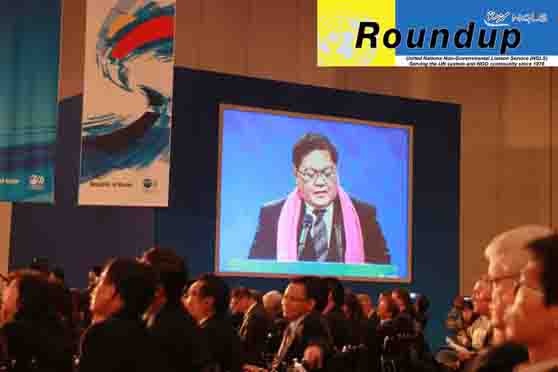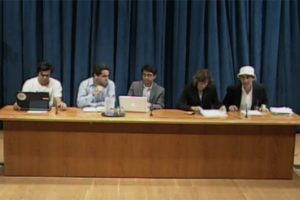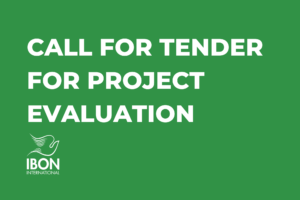UN NGLS interview:
"Editor's note: The following is an interview with Antonio Tujan Jr., IBON International Director, Co-Chair of BetterAid and sole civil [[{“type”:”media”,”view_mode”:”media_large”,”fid”:”89″,”attributes”:{“alt”:””,”class”:”media-image”,”height”:”207″,”style”:”font-size: 12px; width: 310px; height: 207px; margin: 10px; float: right;”,”typeof”:”foaf:Image”,”width”:”310″}}]]society representative in the negotiations on the outcome document of the Fourth High Level Forum on Aid Effectiveness (HLF4) held in Busan, South Korea in late 2011. The interview was conducted by the United Nations’ Geneva-based Non-Government Liaison Service (NGLS) and was first published in the NGLS e-Roundup, January 2012, pp. 6-7. The NGLS e-Roundup issue is accessible at http://www.un-ngls.org/IMG/pdf/RU_HLF4.pdf. We are posting below the full text of the interview, with several clarificatory brackets for spelling out acronyms".
NGLS: What were some of the most fervently debated issues during the preparatory process within civil society?
There were of course a million and one issues that CSOs [civil society organizations] around the world wanted to address. But the most common concerns revolved around a) democratic ownership of the development process and policies, b) human rights?based approaches to development as the standard operating principle and procedure, c) better and more ambition in donor commitments to ensure equitable development cooperation partnerships including transparency, untied aid, alignment to country systems, predictability and rights?based results.
NGLS: What was civil society’s main achievement in the HLF4 process? What is the biggest issue that remains unachieved?
It was able to move the agenda from only aid effectiveness to an expanded and deepened agenda of development effectiveness that is more premised on democracy and human rights?based results. We need better commitments in equitable, transparent, people?focused aid from OECD [Organisation for Economic Co-operation and Development] donors. We need commitments for accountability and regulation of the private sector and better commitments from new BRICS [emerging countries such as Brazil, Russia, India, China, and South Africa] donors to effectiveness.
NGLS: In light of the answer to the question above, how would you assess the civil society mobilization process in the lead up to this Forum? What could be improved for the next global?level discussion?
CSOs were very effective in bringing diverse voices together, acting from the country levels up to the global level, working on technical issues at par with governments in a very critical and constructive way so that CSOs were recognized as key to achieving success in the preparations for and at Busan. Key to this was the commitment and capacity of several organizations and networks, the construction of BetterAid (and also Open Forum) as an “open platform,” a mechanism for inclusive participation that is new and different from networks and platforms in the past.
We would like to coordinate our work better by constructing a unified global platform that is interlinked to several open platforms in work streams and open platforms at all levels down to country level, which will be the focus of work after Busan.
NGLS: For the first time in the history of the High Level Forum on Aid Effectiveness, a civil society representative could take part in the actual negotiation process. What will this entail for civil society and other actors in the implementation process of the outcome document?
No one is a signatory to the outcome document which remains voluntary for everyone. But CSOs do endorse it – and being CSOs we have a dual attitude to this document: 1) as watchdogs, who have and maintain a normative role in society, we are critical of the document and continue to push to improve it and ensure improved implementation; 2) as parties to the document, we are also morally bound to implement them, and indeed we will ensure the appropriate progressive interpretation of the commitments in this regard, including the commitment for implementation of the Istanbul Principles and Siem Reap Framework of CSO Development Effectiveness.
We are now gearing up to actively implement the commitments by setting up multi?stakeholder country frameworks or compacts in which CSOs will be able to take government and international development partners to account and ensure implementation of commitments for development effectiveness. We will also actively participate in regional, continental and global initiatives and activities for monitoring and ensuring support for country level implementation.
NGLS: How were you selected/elected as the CSO Sherpa? What were some of the biggest challenges that you faced in this position – both within the civil society community and during the negotiation process?
The BetterAid open platform has a Global Coordination Group composed of more than 35 CSO networks which decided on my selection as the CSO Sherpa. This was also supported by Open Forum, the open platform specifically engaged with CSO development effectiveness and a CSO enabling environment. BetterAid has thousands of direct CSO participants besides tens of thousands of indirect participants. A CSO Sherpa is in a sense the antithesis of the usual Sherpa who has upward accountability. My accountability is downward and thus involves an elaborate but difficult process of information, gathering views and negotiating positions within civil society. BetterAid created a Negotiation Team which supported the Sherpa besides the support from the Secretariat.
We will publish my reflections on the negotiations which were very interesting. Having a CSO Sherpa means having a person with a normative framework (by definition of CSO advocacy responsibility) that needs to deal with compromises in negotiations. This is also complicated by having a moral and not sovereign authority. It is an interesting addition to the equation of international diplomacy – which has tremendous merits and advantages, but also superlative challenges.
NGLS: Where is the international community at in supporting a paradigm shift from aid effectiveness to development effectiveness? How much progress has it made and how much more does it have to do?
The two years preparation to Busan was a process of CSOs convincing the international community to accept development effectiveness which everyone has accepted but in different definitions and interests. It is a miracle but also a result of give-and-take that tthe Busan Outcome Document has been endorsed. The test, of course, is in the implementation – a challenge that CSOs are gearing up for.
NGLS: What is most needed to ensure that the commitments made in Busan are kept by all stakeholders—including civil society?
The agreement to create a political rather than technical successor to the Working Party is one assurance that the commitments which are fundamentally political will be kept. Second, a more effective organized action by civil society and parliaments will be crucial as the most important stakeholders to ensure political commitment in implementation. There is also a large demand for fulfilling capacity development needs of institutions not only of the executive branch, but also parliaments and civil society. Busan has pointed to this and I hope that there will be better international coordination to deliver.


![[WEBINAR] On the Human Rights Situation in the Philippines: Lessons from the 4th Cycle of the Universal Periodic Review](https://iboninternational.org/wp-content/uploads/2023/02/327873979_5917321721660855_5378398432499176061_n-300x200.jpg)
